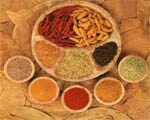Indian spices and powders can expose young children to toxic lead. The consumption of these spices elevates the risk of lead poisoning in children.

Indian spices and powders can expose young children to toxic lead. The consumption of these spices elevates the risk of lead poisoning in children, especially in children below six, which can further cause neurological impairment.
Even low levels of lead exposure can cause behavioural changes in children. Researchers from America studied 86 imported spices and 71 ceremonial powders to determine the lead concentration in these products and predict their effects on ingestion on blood lead levels in American children.
It was found that around 22 of the 86 spices and 46 of the 71 powders had high amounts of detectable lead. However, the spices had much lower lead content than the powders, vermilion (<I>kumkum or sindhoor</I>) ranking the highest with 47 percent to 67 percent lead concentration. Other products with higher lead levels were kohl, <I>henna</I>, tamarind candy, mustard seeds, and asafoetida (hing).
On an average, the Indian products contained double the amount of lead than other foreign brands. The lead concentration exceeded the European Union and the U.S. Food and Drug Administration's recommended limit of 2 to 3 micrograms lead per gram of product.
Though the powders are not edible substances, children might ingest them through the food prepared by the parents. Moreover, infants too are exposed to them through inhalation or breast-feeding.
The researchers suggested that labelling of these items should be carefully monitored, and low-lead sindhoor (less than five micrograms per gram) could be a safer alternative.
DoctorNDTV is the one stop site for all your health needs providing the most credible health information, health news and tips with expert advice on healthy living, diet plans, informative videos etc. You can get the most relevant and accurate info you need about health problems like diabetes, cancer, pregnancy, HIV and AIDS, weight loss and many other lifestyle diseases. We have a panel of over 350 experts who help us develop content by giving their valuable inputs and bringing to us the latest in the world of healthcare.












